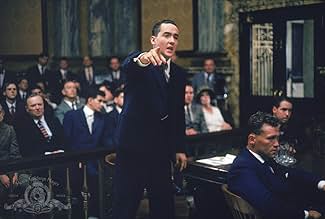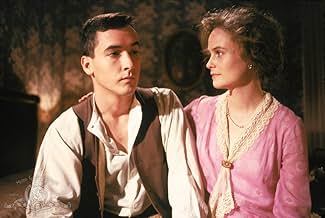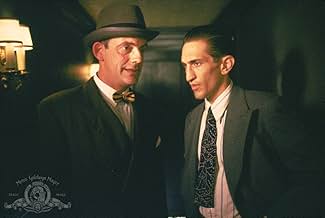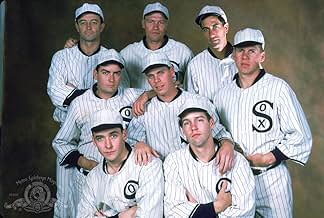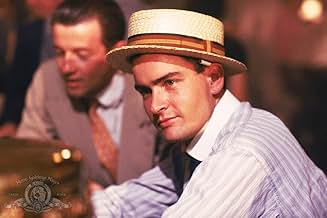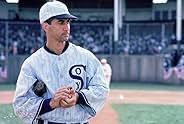A dramatization of the Black Sox scandal when the underpaid Chicago White Sox accepted bribes to deliberately lose the 1919 World Series.A dramatization of the Black Sox scandal when the underpaid Chicago White Sox accepted bribes to deliberately lose the 1919 World Series.A dramatization of the Black Sox scandal when the underpaid Chicago White Sox accepted bribes to deliberately lose the 1919 World Series.
- Awards
- 2 nominations total
James Desmond
- Smitty - The Writers
- (as Jim Desmond)
- Director
- Writers
- All cast & crew
- Production, box office & more at IMDbPro
Featured reviews
I've never been a fan of baseball. The only movies about baseball that could interest me were comedies ("Major league" , "Dullham bulls") . Until I've seen "Field of dreams" and this one. Then I realized that you could make a serious movie with baseball in it.
"Eight men out" is a story about corruption. The movie never takes any side , it allows us to choose our own interpretation of whole story. It seems that everyone here has some sins – the players , the club owners, the journalists and frauds.
The movie has cast full of stars – John Cusack ("Say anything"), Christopher Lloyd ("Back to the future") , Charlie Sheen (TV series "Two and half men") , Michael Rooker ("Cliffhanger") . It's entertaining even for someone who doesn't know a thing about baseball (like me). It's quite long movie (almost 2 hours) , yet never a moment is wasted . The atmosphere of the post - I world war America is top notch , especially the music .
A good movie worth a chance . Recommended for sports fans. I give it 7/10.
"Eight men out" is a story about corruption. The movie never takes any side , it allows us to choose our own interpretation of whole story. It seems that everyone here has some sins – the players , the club owners, the journalists and frauds.
The movie has cast full of stars – John Cusack ("Say anything"), Christopher Lloyd ("Back to the future") , Charlie Sheen (TV series "Two and half men") , Michael Rooker ("Cliffhanger") . It's entertaining even for someone who doesn't know a thing about baseball (like me). It's quite long movie (almost 2 hours) , yet never a moment is wasted . The atmosphere of the post - I world war America is top notch , especially the music .
A good movie worth a chance . Recommended for sports fans. I give it 7/10.
I especially enjoyed Studs Terkel and John Sayles as the two sportswriters, Fullerton and Lardner. They're very droll. They act as a kind of Greek chorus, making cynical wisecracks, keeping the audience clued in on what's supposed to be going on. As the White Sox play out yet another crooked game, Sayles said to Terkel, "Nothing but fast balls." "Nice, sloow ones," adds Terkel. It gets better. Terkel writes a column for the Chicago paper accusing gamblers of corrupting the game of baseball and Sayles is reading it aloud. "Writers are tainting the game," or something, says Sayles. "Keep reading," says Terkel. "The game would be better off without the long-nosed, thick-lipped Eastern element preying on our boys in the field." Terkels smiles around his cigar and says, "Makes you proud to be a sportswriter, doesn't it?"
The rest of the movie is pretty good too, although I sometimes get the characters and their motives a little mixed up. The baseball scenes are very well done. I say this, being no big fan of the sport myself. Charlie Sheen (a true aficionado) looks like he's heaving a heavy bat as he clunks out a hit, not a rubber prop. I admired too the way the series games swung back and forth as the players on the take tried to figure out if they were playing for the money or for themselves. It's tough to throw a game because part of one's self always wants to do what one does best -- in this case, play baseball well. The German ethologists call it "Funktionslust." In the end, despite some indecision, they do however lose.
The movie isn't kind to the gamblers or to the owners. Comisky was incredibly cheap and greedy. The script gives this as one of the reasons why the players agreed to throw the game. As Strathairn says when someone offers him a part payment, "I don't care about the money." He's throwing the games to foul up Comisky who has just denied him a promised bonus because Strathairn, playing the pitcher Cicotte, has only played 29 games instead of the 30 they'd agreed upon. Comisky has made him sit on the bench for the last few games so he wouldn't cross the bonus threshold. (Question: Given that Comisky cheated Cicotte of the contracted bonus, was Cicotte morally justified in throwing the games?)
The movie isn't nice to the gamblers either. Not only don't they pay off but they treat the players with contempt. Arnold Rothstein ("A.R.") treats EVERYBODY rudely. He never says hello when he enters a room, never says good-bye when leaving, and never smiles.
I kind of liked this. Sayles may not be a master but his films are always highly individualized. I cannot visualize him directing "Die Hard With A Sardonic Grin."
The rest of the movie is pretty good too, although I sometimes get the characters and their motives a little mixed up. The baseball scenes are very well done. I say this, being no big fan of the sport myself. Charlie Sheen (a true aficionado) looks like he's heaving a heavy bat as he clunks out a hit, not a rubber prop. I admired too the way the series games swung back and forth as the players on the take tried to figure out if they were playing for the money or for themselves. It's tough to throw a game because part of one's self always wants to do what one does best -- in this case, play baseball well. The German ethologists call it "Funktionslust." In the end, despite some indecision, they do however lose.
The movie isn't kind to the gamblers or to the owners. Comisky was incredibly cheap and greedy. The script gives this as one of the reasons why the players agreed to throw the game. As Strathairn says when someone offers him a part payment, "I don't care about the money." He's throwing the games to foul up Comisky who has just denied him a promised bonus because Strathairn, playing the pitcher Cicotte, has only played 29 games instead of the 30 they'd agreed upon. Comisky has made him sit on the bench for the last few games so he wouldn't cross the bonus threshold. (Question: Given that Comisky cheated Cicotte of the contracted bonus, was Cicotte morally justified in throwing the games?)
The movie isn't nice to the gamblers either. Not only don't they pay off but they treat the players with contempt. Arnold Rothstein ("A.R.") treats EVERYBODY rudely. He never says hello when he enters a room, never says good-bye when leaving, and never smiles.
I kind of liked this. Sayles may not be a master but his films are always highly individualized. I cannot visualize him directing "Die Hard With A Sardonic Grin."
John Sayles' Eight Men Out is a fantastic historical movie. We are told the story of the 1919 White Sox from so many angles with so many well developed characters that the result is beautifully authentic. If you have any questions about why and how the World Series was fixed your answers are here. Every character seems so true to the point were you can see yourself maybe taking the path of many of those players if you were in their shoes. That sums up the movie perfectly, in this movie better then any other historical drama I've ever seen, you are in the shoes of the characters. The acting is phenomenal, David Strathairn gives the performance of the movie as veteran pitcher Ed Cicotte. Strathairn in particular along with John Cusack (Buck Weaver) and John Mahoney (Manager) elevate the movie from a history book to a heart-breaking story about real people without resorting to cheap sentiment tricks. Sayles nicely downplayed the role of Joe Jackson (DB Sweeney). Jackson was not the focus of the scandal, he was simply the best player involved. We see Jackson as ignorant and vulnerable, (unable to read and write) the scene when he tells Kid Gleason he doesn't want to play is a fabulous touch, Jackson worries about the scandal and like a child, he tries to run away. All supporting characters do a fine job especially Christopher Lloyd, Charlie Sheen, Sayles himself, Michael Lerner and the actors who played "College Boy" Eddie Collins (good court scene) and Commissioner Landis (dead ringer). Although this is the greatest sports movie ever made, it goes far beyond sports and it will appeal to non-sports fan as a touching morality tale about real people. ****
This is one of the greatest sports stories ever told, the real story about how and WHY they fixed the World Series. Eliot Asinof's book should be read by anyone interested in history, and Sayles does an admirable job of tying it all together into a script (Sayles even cast Asinof in the movie, and then cast him again in Sunshine State.) It's a story that anyone interested in a history of America, a history of labor and management, a history of the greatest game will definitely enjoy. After reading it, the Shoeless Joe character from "Field of Dreams" suddenly has a resonance which that particular film could never explain (though it is nicely explained in the source for that film "Shoeless Joe") Also worth reading is "The Glory of Their Times" an oral history of early baseball.
Eight Men Out provides a "Reader's Digest" version of the complicated events surrounding the 1919 World Series.
If you forgive the fact the film has to simplify certain aspects of the conspiracy in order to make the film easier to digest, then you will find that Eight Men Out is a worthy film and in the category of "baseball movies" it's one of the best.
There are anachronisms in the film here and there, the worst of which is Buck Weaver's question asking which of the lawyers was the "Babe Ruth" of law. Sure Babe Ruth was coming into his own by 1920, but most ballplayers in that era would not have place Ruth in the class of Cobb, Tris Speaker or Walter Johnson. For baseball fans, this line in particular really comes off as shallow, especially since the rest of the film really tries to capture the "dead-ball" era. For the most part though, this film feels and sounds a lot like America right after World War I ends, a fascinating time and place.
Studs Terkel steals the show in my estimation. His character in the film is not far from whom he is in real life and his authenticity is undeniable. John Sayles is a little stiff by comparison and his singing in the railway car (which according to legend did actually happen), is rather difficult to bear. None the less, his direction makes up for his foibles as an actor.
Straitharn is another gem in this movie, and once again this actor seems to get right to the soul of the characters he is given to play. Eddie Cicotte's dilemmas are written all over Straitharn's face in every scene, he's also given some of the best dialog in the film. Cusack plays his part well, despite the fact that many of his scenes are reduced to clichés. Cusack's best moments are when he is frustrated about his inclusion in the conspiracy trial, despite the fact he gave his all to try and win the series. His outbursts in the courtroom seem perfect, as if drawn from the trial transcripts themselves.
Joe Jackson is given unfair treatment. If "Field of Dreams" mythologizes Jackson to point of hyperbole, "Eight Men Out" plays up his illiteracy with too much of a heavy hand. Joe Jackson wasn't stupid, indeed if you read his last major interview before he died, he speaks about the "Black Sox" with great alacrity and clarity. He was not as ignorant as this film would have you believe. One day someone will produce a film about Joe Jackson, that will portray him accurately, but Eight Men Out is not that film.
Although their roles are very minor, Kid Gleason and Ray Schalk are really well played and written. These two went through a very difficult time during the series, and this is well demonstrated. One minor beef is that Nemo Leibold, Shano Collins and other players outside of the conspiracy are never touched upon at all. This is understandable to a degree given the relatively short length of the film, despite the complexity of the subject matter.
The baseball scenes themselves are well done. The bats, balls, gloves and uniforms look like the equipment of that era and the ballparks are successful mock ups for the most part. There are even a couple of nifty athletic displays in the outfield that must have taken several takes to pull off.
Overall, this is my second favorite baseball movie, next to "Bull Durham". Its a little light on some of the details of the conspiracy, but it makes up for it in other areas. It has some great music, some great sets, some solid acting and overall seems genuine and fair to all the major players in the conspiracy.
Eight Men Out isn't perfect, but it isn't as flawed as Roger Ebert would have you believe. If you a fan of baseball in fact, I'd say its mandatory viewing.
If you forgive the fact the film has to simplify certain aspects of the conspiracy in order to make the film easier to digest, then you will find that Eight Men Out is a worthy film and in the category of "baseball movies" it's one of the best.
There are anachronisms in the film here and there, the worst of which is Buck Weaver's question asking which of the lawyers was the "Babe Ruth" of law. Sure Babe Ruth was coming into his own by 1920, but most ballplayers in that era would not have place Ruth in the class of Cobb, Tris Speaker or Walter Johnson. For baseball fans, this line in particular really comes off as shallow, especially since the rest of the film really tries to capture the "dead-ball" era. For the most part though, this film feels and sounds a lot like America right after World War I ends, a fascinating time and place.
Studs Terkel steals the show in my estimation. His character in the film is not far from whom he is in real life and his authenticity is undeniable. John Sayles is a little stiff by comparison and his singing in the railway car (which according to legend did actually happen), is rather difficult to bear. None the less, his direction makes up for his foibles as an actor.
Straitharn is another gem in this movie, and once again this actor seems to get right to the soul of the characters he is given to play. Eddie Cicotte's dilemmas are written all over Straitharn's face in every scene, he's also given some of the best dialog in the film. Cusack plays his part well, despite the fact that many of his scenes are reduced to clichés. Cusack's best moments are when he is frustrated about his inclusion in the conspiracy trial, despite the fact he gave his all to try and win the series. His outbursts in the courtroom seem perfect, as if drawn from the trial transcripts themselves.
Joe Jackson is given unfair treatment. If "Field of Dreams" mythologizes Jackson to point of hyperbole, "Eight Men Out" plays up his illiteracy with too much of a heavy hand. Joe Jackson wasn't stupid, indeed if you read his last major interview before he died, he speaks about the "Black Sox" with great alacrity and clarity. He was not as ignorant as this film would have you believe. One day someone will produce a film about Joe Jackson, that will portray him accurately, but Eight Men Out is not that film.
Although their roles are very minor, Kid Gleason and Ray Schalk are really well played and written. These two went through a very difficult time during the series, and this is well demonstrated. One minor beef is that Nemo Leibold, Shano Collins and other players outside of the conspiracy are never touched upon at all. This is understandable to a degree given the relatively short length of the film, despite the complexity of the subject matter.
The baseball scenes themselves are well done. The bats, balls, gloves and uniforms look like the equipment of that era and the ballparks are successful mock ups for the most part. There are even a couple of nifty athletic displays in the outfield that must have taken several takes to pull off.
Overall, this is my second favorite baseball movie, next to "Bull Durham". Its a little light on some of the details of the conspiracy, but it makes up for it in other areas. It has some great music, some great sets, some solid acting and overall seems genuine and fair to all the major players in the conspiracy.
Eight Men Out isn't perfect, but it isn't as flawed as Roger Ebert would have you believe. If you a fan of baseball in fact, I'd say its mandatory viewing.
Did you know
- TriviaIn many scenes, players toss their gloves down on the field near their positions before they head to the dugout. Until the 1950s, players frequently left their gloves on the field while at bat. Because of the danger of players stepping on or tripping on them, and batted or thrown balls bouncing off them in odd directions, Major League Baseball requested, then demanded, players to take their gloves with them to the dugout. They finally complied after a rule change and fines.
- GoofsShoeless Joe Jackson signs his confession with an "X". Jackson was illiterate, but he could sign his name by mimicking a pattern. Autographed baseballs and photographs from the time prove it.
- Quotes
[about their opponents]
1st Cincinnati Reds Player: These guys don't look so tough.
2nd Cincinnati Reds Player: Yeah, that's what Custer said when the Indians took the field.
- Crazy creditsThe opening credits are done against a cloudy blue sky, first going up, then to the right, and down to the bottom (kind of like a fly ball). Despite the ensemble cast, the most well-known leading and character actors at the time are credited first in alphabetical order, then lesser known actors that had roles that were just as large or larger are credited in pairs of two. Example: John Cusack, Christopher Lloyd, and Charlie Sheen are credited first, due to their successes with The Sure Thing (1985), Back to the Future (1985), and Platoon (1986), respectively; however, in pairs, Michael Rooker, Kevin Tighe, and Richard Edson also had pivotal roles, but were lesser known. Sheen already was well-established but had only a few minutes of screen time in the movie, Lloyd and Edson always are together, playing gamblers, but Lloyd was a much more well-known actor and credited first.
- Alternate versionsFive seconds were cut from the British theatrical release in order to obtain a "PG" rating by removing a use of strong language. The film was later released uncut on video and the rating was upgraded to "15", which was subsequently downgraded to "12" for the DVD.
- SoundtracksI'm Forever Blowing Bubbles
Written by Jaan Kenbrovin (as Jann Kenbrovin) and John W. Kellette (as John William Kellette)
Published by Warner Bros. Music, a division of Warner Bros. Inc.
Used by permission. All rights reserved.
- How long is Eight Men Out?Powered by Alexa
Details
Box office
- Budget
- $6,100,000 (estimated)
- Gross US & Canada
- $5,680,515
- Opening weekend US & Canada
- $1,129,491
- Sep 5, 1988
- Gross worldwide
- $5,680,515
Contribute to this page
Suggest an edit or add missing content




